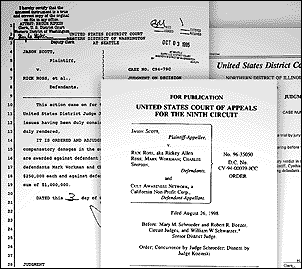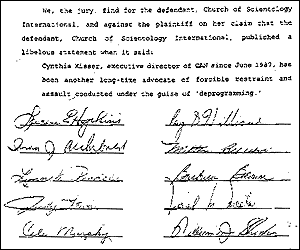
|

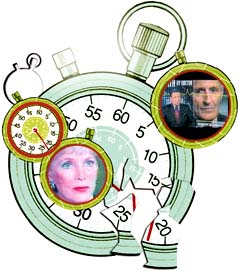
|
 |
60 Minutes continues to come under fire for censoring facts and manufacturing only news its producers, including Mike Wallace and Leslie Stahl, want viewers to see.
|
|
Manufacturing the News
|
“Just when you think the media has hit bottom, something happens to let us know that we haven’t yet excavated the last layer of pointless excess. Not by a long shot.”
– The Washington Post
December 2, 1998
|
by Richard Wieland

illions of American 60 Minutes viewers watched Jack Kevorkian put Thomas Youk to death with a lethal injection of potassium chloride. Kevorkian claimed to have participated in 130 similar deaths, in which cases the deaths were self-administered by the individuals concerned. With Thomas Youk, debilitated by Lou Gehrig’s disease, Kevorkian did the deed and videotaped the entire event—including the preparation of the poisons, administering the lethal injection, and finally a remorseless on-camera demand to be prosecuted for murder.
Kevorkian sent the tape to 60 Minutes and it was promptly aired.
The backlash from critics and peers condemning the broadcast was almost immediate. A group of six CBS affiliates refused to air the segment. The Washington Post and U.S. News and World Report published articles sharply critical of 60 Minutes’ decision to broadcast the Kevorkian video.
Executives at 60 Minutes arrogantly brushed off criticisms of the show. “As soon as I saw the tape and saw that it didn’t make me squeamish, I knew we had to run it,” said program producer Don Hewitt.
Mike Wallace, who narrated the segment and provided the chilling voice-over, “He’s dead,” when Youk’s head lolled lifelessly on camera, was equally blase.
“If it made me uncomfortable, I wouldn’t have run it,” he said. “I didn’t think twice.
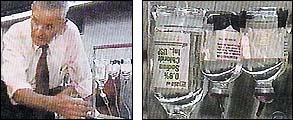
|
 |
In a notorious December 1998 edition, 60 Minutes aired a videotape sent in by “Dr. Death,” Jack Kevorkian, documenting his killing-by-consent of patient Thomas Youk. Questions of media ethics in forwarding Kevorkian’s macabre campaign of euthanasia continue to haunt 60 Minutes in light of his murder conviction.
|
|
I didn’t flinch. Why should I?”
Those statements say a great deal about the program which for years has set an industry standard of television journalism. That “standard” is easily called into question when journalists report with the attitude that they do not have to be held accountable for the consequences of stories they produce.
That lack of accountability underscores journalistic excesses and fills the gap that divides reality from events the way journalists want them to be seen.
A classic case in point of that journalistic divide was 60 Minutes’ segment on the former Cult Awareness Network. The very premise of the show meant that producer Richard Bonin and Leslie Stahl had to discard the unanimous findings of two courts about the organization, in order to present their own account of history. That account, aired in December 1997, was since mimiced by other TV news magazines, further perverting history.
Ironclad Case
The story involved Jason Scott, a young Christian man from Washington state who had been kidnapped by a team of deprogrammers recommended to his mother through the CAN “anti-cult” hotline.
After being held against his will for five days, Scott escaped. He subsequently brought suit against both CAN and the deprogrammers and won a $4.85 million judgment in a jury decision which implicated CAN in the kidnapping.
Members sought various ways to deny and avoid the consequences of their actions. Federal Court Judge John Coughenour pointed out that each of the defendants seemed “incapab[le] of appreciating the maliciousness of their conduct....”
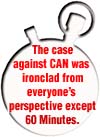
The judgment in the Scott case followed a long chain of arrests and convictions of more than a dozen of CAN’s deprogrammers around the nation, revelations of a hidden arrest record of the group’s president, and the FBI arrest of the group’s chief of security.
Reams of evidence, including statements from CAN’s own executives which supported the conclusions of the jury and the courts, were supplied to 60 Minutes. Most of it was ignored.
CAN appealed the case but the 9th Circuit Court upheld the jury’s decision. CAN subsequently requested a rehearing before the full panel of all 21 judges of the Court. On August 26, 1998, the panel issued its decision affirming the Court’s previous ruling; on March, 22 1999, the U.S. Supreme Court denied CAN’s final appeal.
The case against CAN was ironclad from everyone’s perspective except 60 Minutes.
Support for Kidnapping and Assault
When 60 Minutes examined CAN’s demise, the story they presented reflected little of CAN’s criminal past. Instead, the show’s producers portrayed the group as victims, as Stahl described it in her program, “of a deliberate attempt to harass and intimidate them into silence.”
That allegation was made even more sensational by the inference that members of the Church of Scientology were behind those efforts.
Facts told a different story—one of CAN trying to silence the Church.
For years the Church and its members had exposed CAN’s long-term association with a criminal clique of kidnappers. In an effort to stifle this criticism, former CAN leader Cynthia Kisser brought a libel lawsuit against the Church of Scientology International and its president, Rev. Heber Jentzsch.
That case went before a jury in 1997 in Chicago, then CAN’s home turf. During the trial, approximately three feet of written evidence was presented to the jury to refute Kisser’s case—much of which was also later supplied to 60 Minutes and its producers.
On July 31, 1997, after both sides had fully presented their arguments, the jury handed down a unanimous verdict in favor of the Church and Rev. Jentzsch, leaving intact the conclusion that “Cynthia Kisser, executive director of CAN since 1987, has been another long-time advocate of forcible restraint and assault conducted under the guise of ‘deprogramming.’”
Yet none of this information was presented on 60 Minutes. Rather, 60 Minutes tried to convince its viewers that the organization was, in Stahl’s words, “never involved in illegal deprogramming.”

Manufacturing The News continued...
|

|






